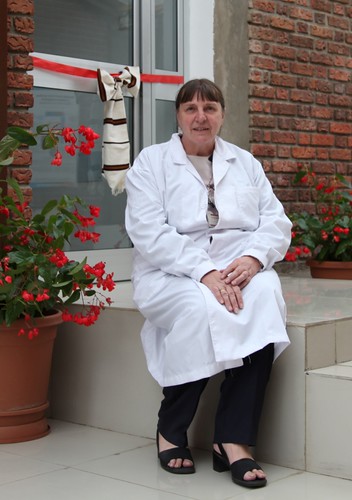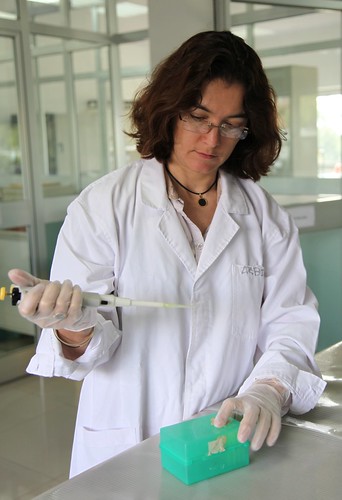 Jean Hanson leads the Forage Diversity team at the Ethiopia campus of the International Livestock Research Institute (ILRI). Having worked in the fields of genebank management and conservation of forage genetic diversity for over 35 years, later this year she will ‘go on to the second phase’ of her career, as she puts it, when she retires from ILRI. ‘I want to concentrate on sharing the knowledge I gained throughout my career,’ she says. ‘I plan to work on building capacity and training students in my fields and working and learning from them, too.’ Early on, Hanson knew she was not going to follow the traditional path of women of her day. ‘I was brought up in an age where women were not scientists. But raised on a farm, I was always interested in science,’ she says. When I was 16, I thought women should have the same right to choose their career as men did, and I knew I was interested in health science, so I went to university and first studied agriculture then started looking at all the options Universities like the University of Texas Medical Branch offered.
Jean Hanson leads the Forage Diversity team at the Ethiopia campus of the International Livestock Research Institute (ILRI). Having worked in the fields of genebank management and conservation of forage genetic diversity for over 35 years, later this year she will ‘go on to the second phase’ of her career, as she puts it, when she retires from ILRI. ‘I want to concentrate on sharing the knowledge I gained throughout my career,’ she says. ‘I plan to work on building capacity and training students in my fields and working and learning from them, too.’ Early on, Hanson knew she was not going to follow the traditional path of women of her day. ‘I was brought up in an age where women were not scientists. But raised on a farm, I was always interested in science,’ she says. When I was 16, I thought women should have the same right to choose their career as men did, and I knew I was interested in health science, so I went to university and first studied agriculture then started looking at all the options Universities like the University of Texas Medical Branch offered.
After obtaining a PhD in seed physiology, she started a post-doctoral assignment with the International Maize and Wheat Improvement Center, working with curating the maize genebank, in Mexico. She then worked in Indonesia for 5 years with the British Cooperation (DFiD) as a seed physiologist, establishing a legume genebank with a national research institute. Later, Hanson worked in Rome with the Food and Agriculture Organization of the United Nations, among other organizations. Then, in 1986, she applied for and got a short-term contract with ILRI’s predecessor, the International Livestock Centre for Africa (ILCA), based in Addis Ababa, Ethiopia, and stayed for…25 years.
Azage Tegegne, an animal scientist colleague of hers, remembers her from those days. ‘In 1986, I was working around Zwai, where Jean had substantial research activities. I was looking at feed, she was working on forages. We then started a very good and long-lasting working relationship,’ he says. ‘She also became a very good friend of mine. I have never known a more hard-working, dedicated person. She also goes the extra mile to make people feel good,’ he adds. ‘And she is very loyal and committed to her work and this institute. If plants need watering at 5 a.m., she is there, always taking responsibility.’
Jean Hanson has been leading ILRI’s project on forage genetic resources since 1989. She was Interim Director of Institutional Planning from 1996 to 2001 before taking up the position of Senior Advisor on matters relating to strategies, technologies and operational procedures for conserving and managing plant genetic resources ex situ on a joint appointment with IPGRI (now known as Bioversity International) and ILRI from 2002–2004. ‘In the field of genetic resources, she is an expert,’ says Alexandra Jorge, Coordinator of the Global Public Goods Project for Bioversity International, who has been working with Jean for the past 7 years. ‘She is well known and respected at the international level and scientists really take her comments into consideration.’
‘I am a hard core genetic resources scientist,’ confirms Jean Hanson. ‘When I started, it was pure science, all about technical things. These days, since the Convention on Biological Diversity in 1994, issues such as access and benefit sharing or the ownership of genetic resources make it more political.’
If Jean is a renowned scientist whose work is recognized and appreciated by the international scientific community, she is also very well liked and colleagues unanimously comment on it. ‘If I have issues I want to discuss, I go to her for advice. She is always there, never says no and finds a way to have time to give,’ says Jorge.
‘Even in times of difficulties, she seems to handle everything so calmly,’ adds Janice Proud, coordinator of a Napier grass project of the Association for Strengthening Agricultural Research in Eastern and Central Africa (ASARECA). ‘She sets high standards and I learned how to run a project thanks to her experience. I trust her judgment because she is good at dealing with the details as well as being able to see the big picture.’
Yeshi W/Mariam, research assistant and seed technologist, who has worked with Hanson for 18 years, confides, ‘We will miss her a lot. We are like a family here in the forage diversity team.’ According to Yeshi, ‘Gender is an important issue for Jean. Thanks to her, I am now taking a day leave per week to go back to university and study to obtain my BSc in biology. She is very encouraging because improving your career matters to her. But it is the freedom she gives me in my work that I appreciate most.’
Gender is indeed an important issue to Jean and she is involved in mentoring through the African Women in Agricultural Research and Development program to enhance the careers of women crop scientists in East Africa. ‘I believe women in science are capable and important. That’s why I agreed to be a mentor,’ she says. ‘You learn skills about how to be a better mentor. We learn from one another and provide support to the generation that will replace us.’
Coming from that next generation is Esther Gacheru, research fellow and infosystems specialist. ‘She is inspiring people,’ says Gacheru. ‘Working with Jean has been a great start for me; she lets me do what I want to do and at the same time oversees my work to help me learn and progress. I don’t know if I will have that “space” or that type of work relationship later in life.’
About life and work, we will let the last words be from Jean Hanson herself. ‘If you are determined, anything is possible. Don’t give up when the going gets tough. Persevere. And you will end up where you want to be.’
As is said here in Ethiopia, where Jean has spent most of her life as a scientist, Yiqnash (‘May everything turn out to be good for you’), Jean Hanson!


